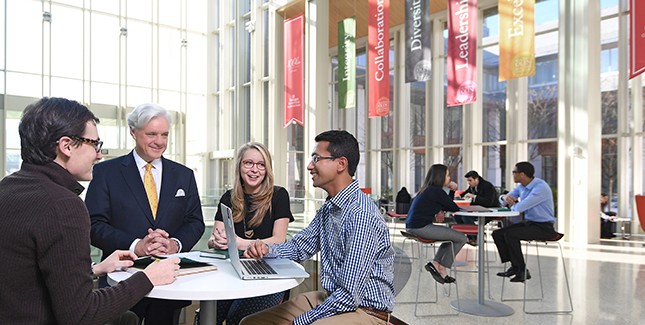
Mark P. Taylor, Dean of the Olin Business School, with students in Knight/Bauer Hall.
James Byard / WUSTL Photos
GRADUATES NOTCHING HIGH-PAYING JOBS AT A HIGH PERCENTAGE
Wharton’s dominance in career outcomes also carried over from last year. Some 99% of Class of 2018 graduates of Wharton had business-related internships before graduation. And the Class of 2018 reported an average annual salary of $80,354 with 90.3% of that class reporting earning an average signing bonus of $12,960. Graduates from New York University’s Stern School of Business reported a slightly higher average annual salary of $80,546, but only 42.1% of those reporting salaries also reported earning a signing bonus, with an average of $10,018. NYU and Wharton graduates were the only ones to report an average annual salary higher than $80,000, but 2018 graduates from six other schools reported average salaries greater than $70,000 in their first jobs after graduation. Another 28 schools reported starting average salaries at $60,000 or higher, up from 25 last year.
Not only are business graduates earning higher salaries than ever, the data also suggests B-schools are making sure their graduates get jobs soon after graduation at higher rates than ever. Out of those seeking employment, 26 schools reported at least 95% of their Class of 2018 had found full-time employment within three months of graduation. The University of Texas-Austin McCombs School of Business topped the list where an incredible 99.63% of 2018 graduates seeking employment had found full-time employment within three months of graduation. Three other schools had at least 98% and another eight scored between 97% and 98%. The full-time employment average among all 88 schools for last spring’s graduating class was an amazing 88.27% and the average annual salary was $58,915, significantly higher than the national average among all 2018 college graduates, which was $50,390.
GRADUATES REPORTING HIGH SATISFACTION RATES WITH B-SCHOOL EXPERIENCE
Of course the quality of a business education goes well beyond admissions standards and career outcomes. This is why the 43-question alumni survey is also included in ranking. Out of the 43 questions, 16 are considered “core” components to an undergraduate business education and are averaged on a one-to-ten scale for 80% of the alumni score. Among those questions, students are asked to rate how likely they are to recommend the business school to a close friend or colleague, if the business degree was worth its time and cost in tuition, how accessible faculty and alumni were, and how effective academic and career advisors were.
Notre Dame’s Mendoza College topped this year’s one-to-ten scaled questions, averaging 9.53. The College of William & Mary followed, averaging 9.49 and Seton Hall’s Stillman School followed with 9.45. Alumni from 19 schools rated their experiences at an average of 9.0 or higher. Only six schools had scores less than 8.0. The average among all schools was 8.64.
Next, we asked alumni if their first jobs after college were in one of their desired industries and if it was at one of their desired companies. For the Class of 2016, 100% of graduates of Cornell and North Carolina’s Kenan-Flagler Business School reported their first jobs were in their desired industries. As for desired companies, William & Mary graduates reported the highest percentage, where 95.83% ended up in a desired company immediately after graduation.
Last, we asked the alumni if they had a “key signature experience” and if they had a significant international experience. All alumni (100%) of Seton Hall’s Stillman School that participated in alumni survey reported having at least one key signature experience. Among all schools, about 63% of alumni reported having at least one signature experience during their time in college. As for an international experience, more than 95% of alumni from NYU’s Stern School of Business reported having at least one impactful international experience — more than any other school. Only about 34% of alumni that responded across all schools reported having at least one international experience during college.
DIFFERENCES IN P&Q AND U.S. NEWS RANKINGS
The use of hard data is what separate the P&Q ranking from the only other prominent ranking of undergraduate business schools on the market, coming from U.S. News. Instead of relying on school and alumni data, the U.S. News sends a poll to deans and senior faculty members at accredited business schools asking them to rate other schools on a one to five scale. The methodology is largely a popularity contest that perpetuates brand names and leads to many ties.
Still, the data-driven approach leads to a few similarities in results, like Wharton taking first, for example. The University of Michigan’s Ross School also places fourth in both the U.S. News and P&Q rankings. But there are some large differences among the rankings as well. For instance, Ohio State University’s Fisher College of Business is tied for 15th (with Emory’s Goizueta School and Georgetown McDonough) in the U.S. News ranking but place 46th in P&Q. This is largely because Ohio State placed 36th in the alumni score but 68th in the career outcomes section, largely because at about 78%, it has one of the lowest employment rates for the Class of 2018.
Another example in the converse is The College of William & Mary’s Mason School. Mason ties for 44th in the U.S. News ranking, but came in 12th in this year’s P&Q ranking, anchored by a third-place finish in the alumni survey. William & Mary also had high marks in the career category, where more than 96% of graduates seeking employment had a full-time job within three months of graduation, and the average salary earned is more than $64,000.
Also tied at 44th in the U.S. News ranking (there are 18 schools tied at 44th) is Villanova’s School of Business, which places eighth in this year’s P&Q ranking. The reason? Superb scores from alumni and a 96% employment rate with an average salary of just below $64,000. Both William & Mary and Villanova ranked in the top seven in the average of the 16 one-to-ten scaled questions, notching 9.49 and 9.31, respectively.












Questions about this article? Email us or leave a comment below.